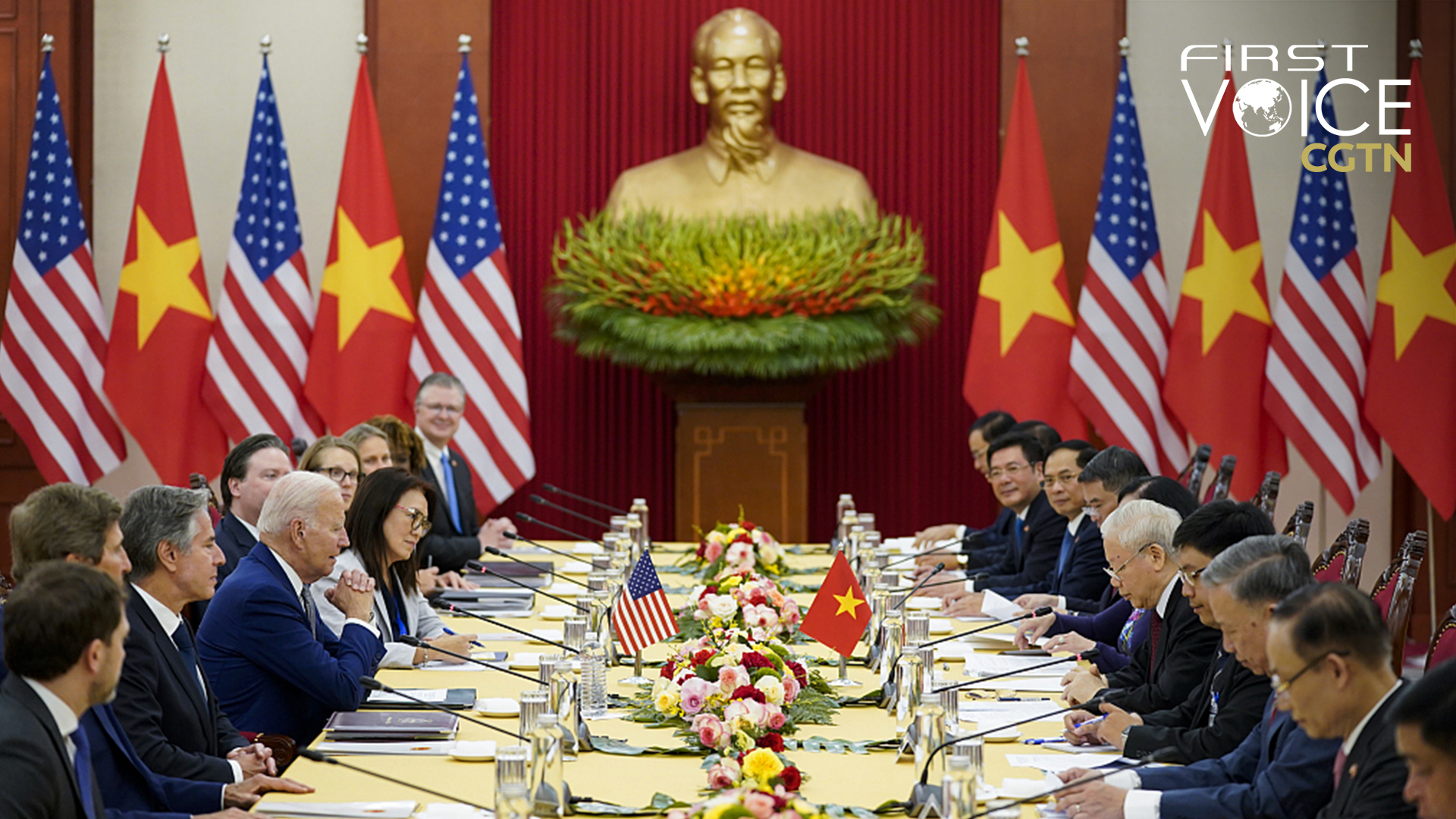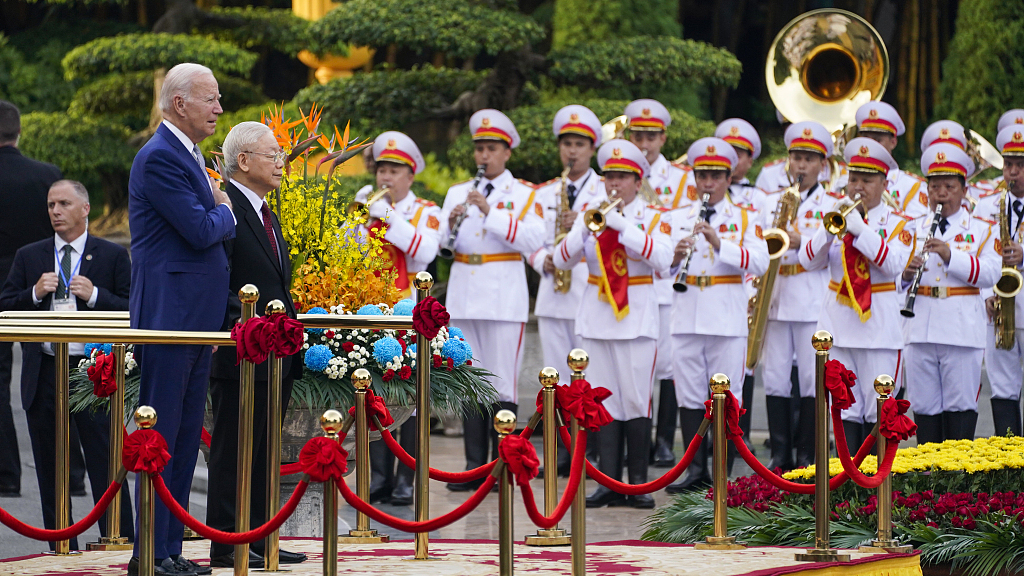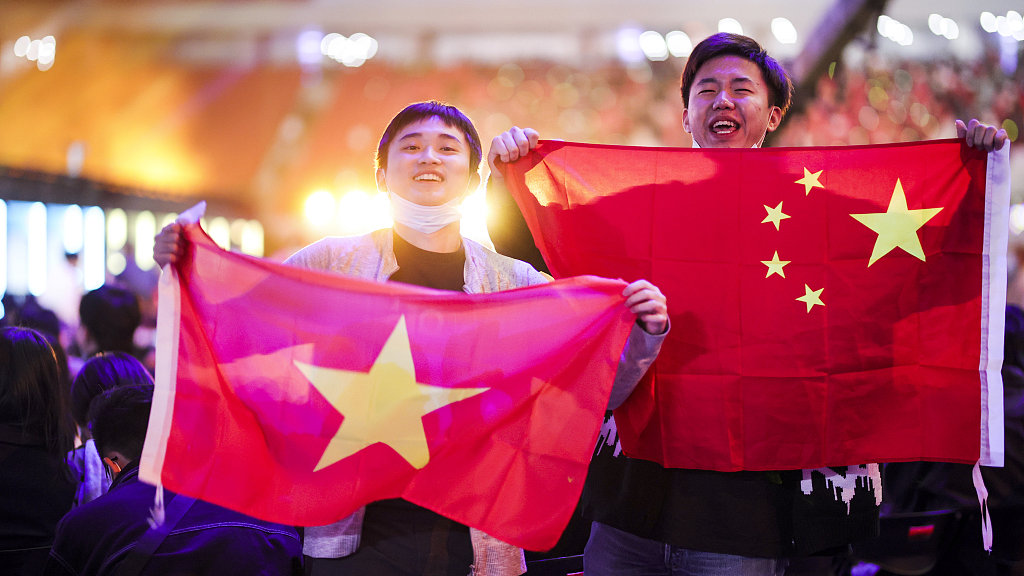
U.S. President Joe Biden (L) participates in a meeting with General Secretary of the Communist Party of Vietnam Central Committee (CPVCC) Nguyen Phu Trong (R) at the Communist Party of Vietnam Headquarters, in Hanoi, Vietnam, September 10, 2023. /CFP
U.S. President Joe Biden (L) participates in a meeting with General Secretary of the Communist Party of Vietnam Central Committee (CPVCC) Nguyen Phu Trong (R) at the Communist Party of Vietnam Headquarters, in Hanoi, Vietnam, September 10, 2023. /CFP
Editor's note: CGTN's First Voice provides instant commentary on breaking stories. The column clarifies emerging issues and better defines the news agenda, offering a Chinese perspective on the latest global events.
China has warned the United States, once again, to discard its "hegemonic and Cold War mentality" in dealing with Asian countries, as Washington ramped up its relationship with Vietnam over the weekend, reportedly with an eye "to counter China."
During his state visit to Hanoi on Sunday, U.S. President Joe Biden and General Secretary of the Communist Party of Vietnam Central Committee (CPVCC) Nguyen Phu Trong signed a new pact elevating the Vietnam-U.S. relationship to a comprehensive strategic partnership.
While Biden asserted that the U.S. decision had nothing to do with containing or isolating China, experts say the unstated strategic agenda behind Washington's move remains "de-risking" in anticipation of potential future conflicts with China.
China remains composed regarding Vietnam-U.S. relations, as Beijing is confident about its own relations with its socialist neighbor. The robust relationship between China and Vietnam is rooted in the bonds between the Communist Party of China (CPC) and the Communist Party of Vietnam (CPV), which diverges significantly from the U.S. approach.
"Vietnam has stressed on multiple occasions that growing the China-Vietnam comprehensive strategic cooperative partnership is its diplomatic priority and a top priority in the country's foreign affairs," Chinese Foreign Ministry Spokesperson Mao Ning reminded the media on Monday, when asked to respond to the U.S. elevating its relations with Vietnam. "It is our view that the development of bilateral relations should not target any third party or harm regional peace, stability, development and prosperity," Mao said.
"We ask the U.S. to respect regional countries' shared aspiration for stability, cooperation and development, abide by basic norms governing international relations, and discard the hegemonic and Cold War mentality when dealing with relations with Asian countries," she added.
Biden insists that the U.S. is not aiming to initiate a "Cold War" with China but rather to improve the relationship between the two major powers. However, many U.S. media outlets have interpreted Biden's visit to Vietnam as an attempt to counter China's influence, further indicating that Washington's motives may run deeper than mere diplomatic overtures.
There's certainly some truth in the claims that Washington's interest in elevating its ties with Vietnam is closely tied to the ongoing tensions between China and the U.S. Without these tensions, Washington might not have been as eager to strengthen its relationship with Vietnam.
U.S. containment strategies face certain failure

U.S. President Joe Biden participates in a welcome ceremony hosted by General Secretary of the Communist Party of Vietnam Central Committee (CPVCC) Nguyen Phu Trong at the Presidential Palace in Hanoi, Vietnam, September 10, 2023. /CFP
U.S. President Joe Biden participates in a welcome ceremony hosted by General Secretary of the Communist Party of Vietnam Central Committee (CPVCC) Nguyen Phu Trong at the Presidential Palace in Hanoi, Vietnam, September 10, 2023. /CFP
The U.S. had expressed its desire to upgrade the relationship with Vietnam prominently during U.S. Vice President Kamala Harris's visit to Hanoi in 2021. While Vietnam has shown a more relaxed approach to this partnership, the U.S. hasn't hidden its urgency in involving Vietnam in its Indo-Pacific strategy, which has "containing China" as one of its core agenda.
The move also comes at a time when the U.S. is looking to "de-risk" from the uncertainties caused by its tensions with China, especially concerning semiconductor technology and rare earth minerals.
Biden has emphasized the deepening cooperation between the U.S. and Vietnam in various technological sectors including cloud computing, semiconductor, artificial intelligence and aviation, while also highlighting the importance of Vietnam in the supply of critical minerals. This supports the U.S. plans of seeking to reduce its reliance on China and diversify its supply chain to mitigate future China-U.S. tensions.
However, achieving these goals will be both challenging and time-consuming. Building the infrastructure and expertise required to produce advanced chips, for instance, is a complex process that will take years to materialize.
Should the United States successfully assist Vietnam in advancing its semiconductor production capabilities, China stands to gain, not lose. A thriving semiconductor sector in Vietnam would facilitate China's efforts to diversify its chip supply chain, effectively weakening the U.S. containment strategies.
China, Vietnam bound by socialist ideology

Two fans holding national flags of Vietnam and China respectively pose together during the League of Legends 2020 Worlds Finals between DAMWON Gaming and Suning at Pudong Football Stadium in Shanghai, China, October 31, 2020. /CFP
Two fans holding national flags of Vietnam and China respectively pose together during the League of Legends 2020 Worlds Finals between DAMWON Gaming and Suning at Pudong Football Stadium in Shanghai, China, October 31, 2020. /CFP
Despite Vietnam's engagement with the United States, the heart of the matter is that its relationship with China remains unparalleled. Both nations are deeply intertwined economically, with China being Vietnam's largest trading partner. This cooperation in supply chains and development is crucial for regional stability and prosperity.
Experts point out that the South China Sea dispute is one of the last remaining issues to be resolved between China and Vietnam. Both sides have agreed to address the matter through negotiations, and Vietnam is unlikely to allow itself to be used by the U.S. to undermine its national security, given its deep trade ties and shared socialist ideology with China.
While the United States may seek to capitalize on Vietnam's strategic location and economic potential within its Indo-Pacific strategy, Vietnam has not allowed this engagement to disrupt its historical and economic ties with China. Vietnam's aspirations to play a role in diversifying the supply chain align with regional interests, ensuring the stability and resilience of supply chains.
Vietnam's historical ties with the United States have been affected by the atrocities and war crimes committed during the Vietnam War. The generational impact of these events continues to shape the pace of Vietnam-U.S. relations.
Furthermore, reports linking a U.S. based terrorist organization to attacks in Vietnam highlight the complex nature of the relationship between Vietnam and the U.S.
Hanoi recognizes that ideological differences present a structural challenge in its relationship with Washington. Therefore, maintaining a stable and close partnership with China remains crucial for Vietnam's socialist aspirations. While the Vietnam-U.S. partnership may be evolving, it will never match the depth and resilience of Vietnam's ties with China, grounded in shared history and mutual trust.
(If you want to contribute and have specific expertise, please contact us at opinions@cgtn.com. Follow @thouse_opinions on Twitter to discover the latest commentaries in the CGTN Opinion Section.)